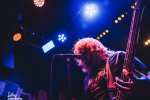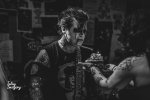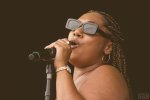Sir Howard Morrison
Bio

Sir Howard Morrison was born in 1936 in Rotorua, the son of Maori All Black Tem Morrison. In 1955 Howard started putting together vocal groups to entertain at Rugby Club socials in Rotorua. At that stage he had been working as a surveyor's chainman and later as a meter reader for the Tourist Department. He was also playing rugby on the back of the scrum for Waikite.
Music was strictly part-time and he had received a little experience, mainly at Te Aute College and in various Maori cultural groups, show bands and concert parties. At that stage he had dreams of becoming a professional entertainer. In 1956 he became a member of the successful Aotearoa Concert Party that toured Australia. On his return, while attending a family gathering, he heard a guitarist Gerry Merito and decided to put together a group with him and also roped in his brother Laurie and his cousin John. The group was called the Ohinemutu Quartet, but soon after they were renamed to the Howard Morrison Quartet. This became the beginning of the most distinguished Show Business career of any New Zealander permanently based there.
The quartet began performing around Rotorua and before long bookings were coming in as word spread about this talented group. The group might never have strayed far from Rotorua had they not been spotted by Auckland entrepreneur Benny Levin in December 1957. He was putting together a group of artists to appear on his touring 'Pop Jamboree', and after seeing the boys at a talent quest, he signed them to be part of his show. He was so impressed with them that he started bringing them to Auckland to play at his venues there. With their reputation growing, Benny negotiated a recording contract with Eldred Stebbing at Zodiac.
The first release in 1958 was There's Only One Of You/Big Man, available in both 78rpm and 45rpm format, as were three of the first four singles. The first wasn't a big seller, but the second, a Maori version of the tune There's A Goldmine In The Sky, called Hoki Mai sold well. It was backed with Po Karekare Ana and also released in 1958, as were two more singles, Haere Ra E Hine/Marama Pai and Marie/Deep Purple.
As tended to be the tradition at that time, Zodiac also released three four-track EP's in 1958. In 1959 Benny Levin took the Quartet on their first national tour, finishing with a full house at the Auckland Town Hall. It was at that show that Gerry Merito's parody of the Lonnie Donegan hit The Battle Of New Orleans was recorded as The Battle Of The Waikato.
At one of their shows they were approached by another budding entrepreneur, Harry M Miller, who was looking for acts for his touring show. The Quartet didn't actually have a managerial contract with Benny Levin, so Harry signed them up and became their new manager. While he was at it, he also signed them up to his new La Gloria label. Meanwhile Zodiac released Short Fat Fannie/Goodbye Baby in 1959 and Stebbing was preparing to release his live version of Battle Of Waikato, when Miller had the boys at his place doing a studio version of the same song. Miller was about to release his when Stebbing found out and the matter went to court. They were still contracted to Zodiac, so Miller was not allowed to release his version at this stage.
Zodiac released their version and it became one of their biggest hits. It was backed with a live recording of Granada. The follow-up single was also a live double from the same concert, Hawaiian Cowboy Song/Little Darlin'. Zodiac only had one more song in their cupboard before the contract ran out, so they released it , Because Of You backed with the original Hoki Mai.
As their new manager, Miller insisted that the boys become full-time professional. Laurie and John couldn't make that commitment, so two new members had to be found in a hurry. Howard persuaded Wi Wharekura and Noel Kingi from Rotorua to join him and Gerry, thus forming the best known Quartet combination.
Starting in January 1960, Miller launched his Summertime Spectacular to incredibly large audiences. The Quartet, topping the bill, played to 20,000 people at Western Springs Stadium and only a week later another 12,000 at Epsom Showgrounds. They soon established themselves as the most popular family entertainers in New Zealand history.
In 1960 La Gloria started releasing their recordings. During that year they released 13 singles, 3 EP's and 2 LP's. This was not classed as overkill considering how popular they were. Stebbing actually beat La Gloria in releasing the first LP. He released an album called These Were Their Finest at the beginning of 1960.
The two La Gloria albums from 1960 were called On Stage Off Stage and Pot Pourri.
On one of the tours in 1960, the group recorded another parody of Lonnie Donegan, My Old Man's A Dustman became My Old Man's An All Black. This was highly topical because of the huge controversy over Maori not being allowed to tour South Africa with that year's All Blacks. Howard recalls the song being recorded in the Pukekohe Town Hall on a little tape recorder beside the stage, and a plastic microphone. The worst recorded song, but it sold the most copies.
Between doing the tours, the Quartet visited Australia, all the time getting more professional as they went. In 1961 they were the support act for the Everly Brothers, Shelley Berman and the Kingston Trio. They actually released their own version of the Kingston Trio's Where Have All The Flowers Gone and it was more popular than the original. 1961 only saw four singles, three EP's and one album. The album was called Always.
Moving into 1962, there was another flood of recordings, with eleven singles, an EP and four albums. The albums were Maori Songs, Alive Need We Say More, Hits Of The Road and Mind If We Sing.
Continuing with the comedy style, two of their singles were more parodies, with Ray Steven's Ahab The Arab becoming Mori The Hori and Pat Boone's Speedy Gonzales becoming George The Wilder Colonial Boy, celebrating the exploits of escaped convict George Wilder.
For five years the Quartet rode the crest of a wave. Between their regular New Zealand tours they did vast amounts of work in Australia, playing at Leagues Clubs, top Hotels and doing Cabaret. Their act became highly polished. It was marked by great natural harmonies, loads of humour, an uncanny sense of timing, and by each member of the group emerging as a soloist.
Harry Miller wanted them to do Las Vegas and London, he had the contacts and the opportunities were there. But Howard was reluctant. To step on the world stage would almost certainly have destroyed their family life and homely lifestyle. Howard has no regrets that he decided to make New Zealand his permanent base.
There was only one release for 1963, and this was an EP, as a dispute over contracts ended the relationship with Harry Miller. Harry was now more interested in promoting overseas artists and shows into Australia and New Zealand, and over the years became New Zealand's largest promoter, bringing in shows such 'Hair'.
The Quartet teamed up with another promoter, Joe Brown, who was responsible for producing the 'Miss New Zealand' touring shows each year. In 1964 Howard had his first solo outing when he toured as support for three American artists, Ben E King, Gene McDaniels and Dee Dee Sharp. He felt very awkward without the other Quartet members, but it was a sign of things to come.
The constant pressures of touring and absence from families were beginning to tell on the Quartet. In the later part of 1964, whilst they were in the midst of a Sydney season, Howard suggested that it was time to end the Quartet. No-one disagreed, so they went back to their original promoter Benny Levin, for him to organise a giant farewell tour of New Zealand. It was a huge success, finishing back in Rotorua where it all began on New Years eve. Apart from occasional rare reunions, the Howard Morrison Quartet never officially performed together again.
In 1965 La Gloria released a double album called The Fabulous Howard Morrison Quartet and then again in 1967 came The Best Of The Howard Morrison Quartet.
For Howard, it was now make or break as a solo entertainer. Back in 1964, La Gloria had released two singles by Howard without the Quartet, even though they were labeled Howard Morrison with the Huhus and the second, Howard Morrison with the Maori Hakas. His first tour of the country in 1965 with the Miss New Zealand Show was difficult for him as he found the audiences expected him to do all the Quartet numbers, by himself.
But Howard persevered, repeating the tours in 1966 and 1967. He released two singles on HMV in 1966 and then joined John Hore, who was also a member of the tours, on an album in 1967 called Take Ten.
In 1966, Howard was invited to play a role in a movie. Pacific Films made a New Zealand musical comedy called Don't Let It Get You, with Howard topping the bill. It contained all the local acts, the Keil Isles, the Quin Tikis, Lew Pryme, a young Kiri Te Kanawa and Normie Rowe from Australia. It didn't make anyone a fortune, but it helped Howard earn the title of 'Entertainer Of The Year' in 1966.
As his solo career began to blossom, doors started opening on the Asian circuit. His first big breakthrough there was a six week season at the Inter-Continental Hotel in Singapore, where New Zealand servicemen stationed there gave him a great boost. Then came the opening of the new Sheraton in Manila, where his one-month engagement grew until it was eventually three months. The high-flyers of Manila really loved Howard, and he even did special shows at the presidential palace. Next was the Hilton, Bangkok, which led to regular appearances on the Asian Hilton circuit, Kuala Lumpur, Singapore, Manila, Taiwan and Hong Kong. Howard developed a huge following in all these capitals.
Then it was Hawaii and a wonderful opportunity to star at the opening celebrations of the Sheraton, Waikiki. During that season his fellow entertainers were Sammy Davis Jr, Andy Williams and Glen Campbell. Howard maintains that Sammy was the greatest artist he has ever seen. Throughout those years of touring Asia and the Pacific, Howard often appeared for the New Zealand Trade Commissioners, helping to spearhead the trade drive into those countries. This work was part of the reason for him being awarded the OBE in 1976.
Between all the overseas traveling, Howard had semi-permanent cabaret residencies in Auckland, first at the Logan Park and then at Tommo's Place at the Station Hotel. The rest of the country was still covered by regular tours. On the recording side, he released two albums on Joe Brown's label in 1968, called Born Free and Power Game. In 1969 he switched to RCA, beginning a long association with them. His first RCA album was Getting It All Together in 1969. It would be thirteen years, 1982, before he released the next one, but when he did, it was huge.
In 1975 Howard turned 40 and a remarkable reunion happened in Christchurch. To celebrate his birthday, also 20 years in show business, and to commemorate Howard's brother Laurie, who had tragically been killed the year before, the Quartet re-assembled for the first time in eleven years. Billed as 'The Return Of A Legend', the two sell-out concerts that night were a momentous occasion. There was pressure for a national reunion tour, but for the group, this was to be a once only nostalgia trip. The event was captured and released in 1976 on an album called Return Of A Legend.
Despite all the glamour and glitz of his stage career, Howard was now suffering from a strange sense of non-fulfillment as just an entertainer, a 'singer of songs'. He had a strong urge to do something more constructive with his talents. he was acutely aware of the lack of achievement by many young Maori. he was shocked by the fact that 75% of them were leaving college without any formal qualifications. He began to ask community workers whether there was any way he could help to address these problems. Fortunately these overtures were greeted favourably, and Howard was appointed as a consultant on youth development for the Department Of Maori Affairs. He undertook an extensive program of school visits designed to improve pupil's sense of self esteem, and to encourage them to move on to higher levels of learning. He also developed wananga or education programmes on marae.
Eventually these programmes were taking off so strongly that in 1979 Howard was appointed to the full-time position of Director Of Youth Development in Maori Affairs. His main thrust was a programme called Tu Tangata, or Stand Tall. Believing that his entertainment skills could be used to put a focus on this campaign, Howard organised a nationwide Tu Tangata tour. The great Quartet came together once more, except for Wi Wharekura, who was replaced by Toni Williams. The Morrison family joined the touring party led by Howard's beloved mother Kahu, who was such an outstanding singer herself. In each centre, a choir of local school children provided some of the concert highlights. Excerpts from these concerts appeared on the 1979 album Morrison Magic.
For a time, while all this work was going on at Maori Affairs, Howard became a scarce commodity on the entertainment scene, television in particular. One outstanding event which broke the drought was a TV Special, recorded before an enthusiastic audience at the Founders Theatre, Hamilton in July 1982. The special was so successful, it finished up the top rating programme for the week. RCA took advantage of this and released an album called Howard Morrison from the show and it was a massive seller. It contained magnificent versions of songs like Begin the Beguine, Granada and a comedy routine called Howie the Maori. But the real highlight was Howard's version of How Great Thou Art. This song arose in a way which nobody could have predicted. Howard had been invited to appear again at a Royal Command Performance when the Queen returned to New Zealand in 1981, and was having trouble deciding what to sing. While at a Tu Tangata hui in Auckland one day, he heard the hymn, How Great Thou Art or Whakaaria Mai being sung during the opening prayers. His hair stood on end and he knew at once that this was his song. Much to the disbelief of many, it was a stunning success at the Royal Concert and when released as a single, it held the number one position on the National charts for five weeks and remained in the charts for over six months.
Howard's life in the 1980's was full of new challenges and fascinating overseas assignments. He promoted New Zealand tourism in countries such as Indonesia, Malaysia and Singapore, he fronted an Aids Awareness campaign in Rarotonga, he hosted a TV documentary made in France, 'Kia Ora - Bon Jour', he even gave a motivational talk to the America's Cup yachties at Fremantle in 1987. The opportunities kept coming in and they still do.
In 1985 Howard released another album called Songs Of New Zealand.
Throughout his career, Howard has regarded recording studios as cold, sterile places. He much preferred to be recorded in front of a live audience where he thrived on the inter-action. Although when he did do a studio album you could be sure that it was going to be good, as was the case with his 1988 album Love Is A Many Splendoured Thing.
The next year, 1989, held many special moments for Howard, there was the release of his new album Live In Concert, but none could match that magical night of the television tribute 'This Is Your Life'. It came two days after his return from France, and he was quite overwhelmed in the first segment of the programme, but as the Quartet appeared, along with his family and old acquaintances, he relaxed and had just about the best night of his life. The public reaction to the show was astounding. It was as if the whole nation had been reawakened to an old friend. TVNZ received hundreds of calls of congratulation and the programme was hurriedly repeated. The call went out immediately for another nationwide tour and Howard responded, playing once again to packed houses. The concerts included a formal segment starring the extended Morrison family. Favourite songs from the concerts were Maori Battalion and Tukua Ahau.
In 1990 Howard was on television in front of the world singing Tukua Ahau at the Opening Ceremony of the Auckland Commonwealth Games. It was a great honour, but once again beaten by an even more honourable event. In April of that year Howard was nominated for a Knighthood and in October the ceremony was held at Howard's home marae of Ohinemutu where he became Sir Howard Morrison.
In September 1990 he also fulfilled another desire, and that was to sing in front of a Symphony Orchestra. A 60-strong Auckland Symphonia was assembled for a performance at the Aotea Centre. It was again a memorable night, with guest appearances from Billy T James, All Black Buck Shelford lead a haka, and Howard's sisters Merenia and Atareta were there to join in on some songs.
As Howard approached 60, a new album was released, celebrating 40 years in show business. It is a collection of his work over the years, from his early days with the Quartet, up until the session with the Symphony orchestra. It is an absolutely magnificent collection, showing the true talent of the man.
Howard didn't stop at that album, he continues to perform live and in 1998 he released another album with a mixture of new studio songs and more live work. I had the privilege of seeing him performing in Sydney that year and must say that he just keeps getting better with age. He was touring, still promoting New Zealand through the New Zealand Tourist Board, and introducing new talent at his shows. His son, Howard Junior, opened the show, and I felt like I was in a time warp. One of my most cherished concerts that I have attended. The album Give Your Love - On Stage Off Stage was released to support the tour.
In 2002, a double CD was released with songs from the quartet and Howard's solo years. Sir Howard Morrison went on to release This Is My Life in 2009, Spectacular in 2011 and How Great Thou Art - The Very Best Of in 2015.
Links
Search for Bands/Artists:
Latest Galleries
NZ Top 10 Singles
- APT.
ROSÉ And Bruno Mars - DIE WITH A SMILE
Lady Gaga And Bruno Mars - BIRDS OF A FEATHER
Billie Eilish - TASTE
Sabrina Carpenter - I LOVE YOU, I'M SORRY
Gracie Abrams - ESPRESSO
Sabrina Carpenter - SAILOR SONG
Gigi Perez - LOSE CONTROL
Teddy Swims - A BAR SONG (TIPSY)
Shaboozey - GOOD LUCK, BABE!
Chappell Roan


 Add A New Artist
Add A New Artist





 Report A Problem
Report A Problem

